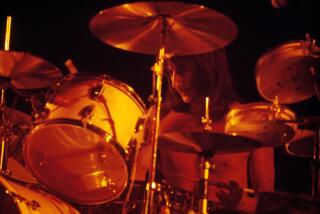Stand-In Delivers for Maiden All-Stars
Saxophonist Ann Patterson knows how difficult it is to find last-minute replacements for her all-female bands. Even with the sizable pool of women instrumentalists in Southern California, Patterson has occasionally been forced to call on men (notably the late bassist Monty Budwig in one memorable instance) to fill empty slots in her acclaimed 17-piece, gender-specific Maiden Voyage big band.
But there was no such problem Friday at Steamers Cafe in Fullerton when Patterson brought in a quintet dubbed the Maiden Voyage All Stars. When trumpeter, vocalist and longtime Maiden Voyage member Stacy Rowles called in sick with the flu, Patterson was able to enlist fine alto saxophonist Sharon Hirata, a former Maiden Voyage member who recently moved back to Los Angeles after several years in the Bay Area.
No matter the size or slant of the band she’s leading, Patterson makes you forget about gender issues as soon as she starts to play. A native of Texas, she combines the rhythm and blues tradition associated with her home state with a certain urban sophistication. The two traits, combined with strong technical skills, gives her a beefy, satisfying sound, one that she put to good use in a first set of better-known standards.
Although she announced to the audience that she too was fighting the flu, Patterson didn’t seem the weaker for it. She glided through “Monk’s Blues” on alto, showing the kind of quirky phrasing and note selection that fits well into that Thelonious Monk anthem.
Her soprano play on “Softly as in a Morning Sunrise” was light and propulsive, springing from the melody in a set of changing variations. Her flute play on Antonio Carlos Jobim’s “One Note Samba” was airy and dance-like. Taking a long sax solo on “Polka Dots and Moonbeams,” she showed both muscle and grace.
Hirata’s alto play, strong, confident and occasionally prone to swagger, also served to defuse any stereotypes about delicate female musicians. Her solo on “Bye-Bye Blackbird” was a model of development, building slowly with consideration before spilling over with streams of crafted tones.
While pianist Linda Martinez’s heavily chordal approach made for more than a few magical moments--her solo rendition of “Monk’s Dream” was one of the set’s highlights--the rhythm section, though competent, didn’t always play to the level of Patterson and Hirata.
Drummer Megan Foley kept adequate time, but her play was often delicate and tentative. Erin Wright, alternating between six-string electric bass and the skinny, upright Chapman Stick, was assertive but in the wrong places, sometimes wandering off the tune into strange realms of her own.
Still, by the end of the first set, the group pulled tightly together on “There Will Never Be Another You,” with the two alto saxophonists stating the theme in unison before Hirata emphasized the song’s melancholy side with a solo that at times recalled popular saxophonist Kenny Garrett.
Despite this more-than-competent performance and a history of boffo performances with the big band (including a Grammy nomination), Patterson still finds acceptance hard to come by.
The big band will celebrate its 20th anniversary this year but has no pending bookings and hasn’t been seen since a Los Angeles concert last May on a double bill with New York-based all-female ensemble Diva. An album, “Now’s the Time,” recorded four years ago is tentatively scheduled for release in March.
The fact that Maiden Voyage, a great band by any standard, hasn’t received its due, especially considering pop music’s infatuation with girl bands, is one of the glaring artistic injustices of the last decade.
More to Read
The biggest entertainment stories
Get our big stories about Hollywood, film, television, music, arts, culture and more right in your inbox as soon as they publish.
You may occasionally receive promotional content from the Los Angeles Times.










